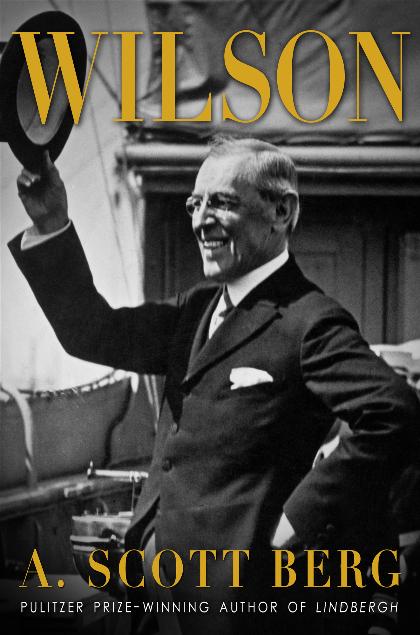
I am reading the excellent Wilson by A. Scott Berg, the definitive biography of President Woodrow Wilson.
Wilson was in many ways the first 'modern' president -- first press conferences, first to visit Europe, a lover of golf, movies and women.
WIlson was also our first and only PhD president, a Princeton prof (and president of the university) who only entered politics at the age of 55. Two years later he was President of the United States.
Although elected president as "the man who will keep us out of war," Wilson found himself inexorably drawn into participation in the first World War, much against his will. "I am from the South" he used to say. "I know what war does." Indeed, Wilson was the first Southern president since the Civil War and, having been born in 1856, was old enough to have had firsthand experience in that conflagration.
When, in 1917, the Congress declared war on Germany and the Central Powers, Wilson returned to his office and broke down and cried.
He cried because he knew that, despite the feverish rhetoric of 'making the world safe for democracy,' he was sending men to their certain deaths.
The Civil War had been the world's first really mechanized war, and it had resulted in 600,000 casualties. But the American Civil War was only a harbinger of what the first World War was to bring. Mechanized death on an industrial scale. Before it was over, tens of millions would perish in what was, essentially, a pointless holocaust. The core of the problem was that generals on both sides applied 19th century tactics -- the gallant charge into enemy lines to 20th century technology -- the machine gun.
There is no 'gallantry' in walking in machine gun fire. Only certain death.
Yet for four long years, neither the Allies nor the Central Powers had the imagination to apply any other tactics, so 1.2 million men died at the Battle of the Somme, for example, to gain a few yards. Idiotic.
As the U.S. is drawn into the war, the rhetoric of the time is all about 'honor' and 'courage' and 'decency,' all of which have nothing to do with mechanized killing on an industrial scale.
Reading the book, one feels the urge to yell out to Wilson, "Stop! Don't do it! This is not about honor or treaties or democracy. This is about the impact of a new technology on an old way of thinking."
Of course, no one does this, and tens of millions go to their deaths.
As I am reading Wilson, I am also reading more and more pieces about 'income inequality' in the U.S. (and indeed worldwide), with blame abounding for 'the evil banks' or 'the 1 percent.' How to restore jobs and full employment, as recovery seems limited to the very few.
In point of fact, the 'economic crisis' bears many parallels to the First World War crisis that WIlson faced.
The first World War, more than anything else, was the impact of 20th century technologies being dealt with with 19th century thinking.
The Great Economic Crisis is, more than anything else, the impact of 21st century technologies being dealt with with 20th century thinking.
Think of the Internet as the machine gun of the 21st century. A brutally fast and efficient way kill jobs at the touch of a button (or the click of a mouse). It is fast, cheap and efficient.
And, just as 1914 machine guns mowed down row after row of brave British and French and German soldiers marching in straight lines directly into the fire, the Internet mows down row after row after row of conventional businesses that also march directly into the line of fire.
Craig Newmark and Craigslist replaced tens of thousands of people who worked in classifieds across the country with a dozen employees in a garage in San Francisco, and brought the entire newspaper industry to its knees -- and probably death. iTunes wiped out Tower Records and indeed the entire record industry. You may find it easy to buy things on Amazon but every time you click the mouse you are killing workers who used to populate the stores that increasingly can no longer compete with the ease and simplicity of online purchasing.
And still, in the world of the web, it is only 1914. We are only just getting started in the mass killings.
And as hundreds of thousands, perhaps millions of middle class jobs vanish forever, never to reappear, what is our response?
No one knows.
No one knows what to do. Just like the generals in the first World War -- except to keep repeating the 20th century mantras that no longer have any real meaning.
NY mayoral candidate Bill De Blasio promises to 'tax the rich.' Newspaper columnists in the New York Times and other places decry the growing gap between rich and poor and the disappearance of The Middle Class.
But what we see happening all around is the impact of 21st century technologies on 20th century thinking.
And like the arrival of the machine gun, unless you take the technology as your starting point, the rest is pretty much a guaranteed massacre.
